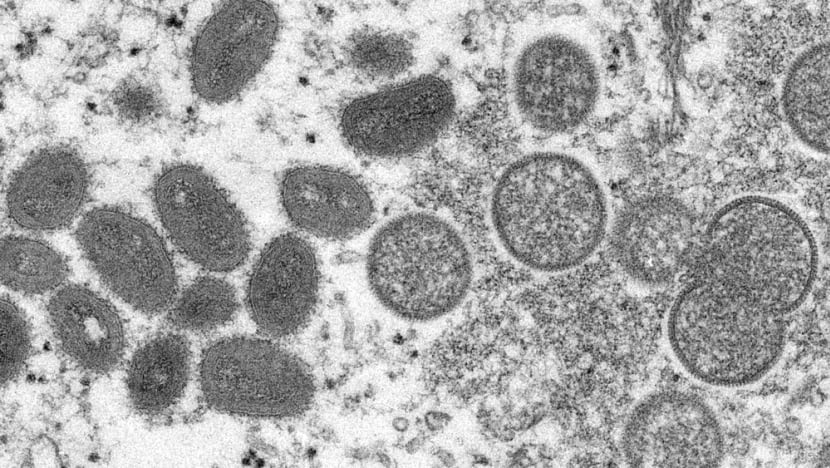No monkeypox infections detected in Singapore since imported case in 2019: MOH

This 2003 electron microscope image made available by the Centers for Disease Control and Prevention shows mature, oval-shaped monkeypox virions (left) and spherical immature virions. (Photo: AP/CDC/Cynthia S Goldsmith, Russell Regner)
SINGAPORE: No monkeypox infections have been detected in Singapore since 2019 when the sole imported case was confirmed in a Nigerian man.
"As of May 20, 2022, there have been no monkeypox cases detected in Singapore since May 2019 when one imported case from Nigeria had been detected and ringfenced," said the Ministry of Health (MOH) on Saturday (May 21).
"In view of the cases in Europe and North America, the Ministry of Health has alerted all medical practitioners to remain vigilant in detecting and reporting monkeypox cases. We will continue to monitor the situation closely."
Monkeypox is a rare disease caused by a virus that is primarily transmitted from animals to humans. Human-to-human transmission, while possible, is limited, noted MOH.
According to the World Health Organization (WHO), about 80 monkeypox cases have been confirmed and another 50 are under investigation in 11 countries as of May 20.
These include Belgium, France, Germany, Italy, Portugal, Spain, the United Kingdom, the United States, Canada and Australia.
Those infected would typically experience fever, headache, muscle ache, backache, swollen lymph nodes and a skin rash that usually appears one to five days after the first symptoms. The rash may resemble blisters caused by chickenpox.
A person is infectious primarily during the period when he or she has symptoms, particularly skin rash.
It typically spreads through close contact with the respiratory tract secretions or skin lesions of an infected person, or through objects recently contaminated by an infected person's fluids or lesions.
Symptoms usually clear up in two to four weeks and the disease is usually "self-limiting", said MOH. However, severe illness and death can occur in some individuals.
The Health Ministry advised travellers to take necessary precautions, including maintaining a high standard of personal hygiene, avoiding direct contact with skin lesions of infected living or dead people or animals, as well as avoiding contact with wild animals and consumption of bush meat.
"Returning travellers, especially from areas affected by monkeypox, should seek immediate medical attention if they develop any disease symptoms within three weeks of their return. They should also inform their doctor of their recent travel history," said MOH.















